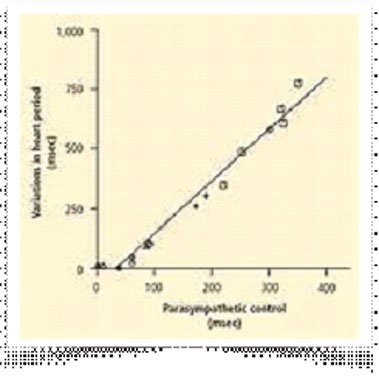Heart Rate Variability Assessment
The Heart Sound Recorder is a cardiovascular assessment tool that allows the heart sounds to be graphed and provides valuable health information.
What is Heart Rate Variability?
Thinking about your health means minding your heart, and you’re no doubt accustomed to paying attention to measures like cholesterol, blood pressure, and triglycerides. There’s one more to add to that list: heart rate variability.
The Heart Rate Variability Test, (HRV), was created in Russia to find the healthiest athletes and train them to compete in the Olympics. This same test is now available to check the health status of the general public.
The test begins by looking at the heart rhythm and its variability during different situations. We know that health is not a destination, rather a constant journey of maintaining a balance or homeostasis. One’s ability to adapt well and fast to its environment is a state of health. A great measure of this adaptability and ultimately nervous system function is Heart Rate Variability (HRV).
For further clarification heart rate variability is the variation in the time between each heart beat. Variability refers to your heart beat’s ability to shift throughout the day. Your heart rate is not meant to stay the same speed at all times; it changes depending on y our activity and emotions.This is different than your heart rate, which is measured by the number of times your heart beats per minute unlike your heart rate, which you can calculate by counting your pulse.
our activity and emotions.This is different than your heart rate, which is measured by the number of times your heart beats per minute unlike your heart rate, which you can calculate by counting your pulse.
The use of Heart Rate Variability equipment has become highly used because it shows the influence of the vagus nerve (a major component of your parasympathetic nervous system or the rest and digest centers of your body) and the sympathetic nervous system, thus showing us the function of the Autonomic Nervous system (essentially how you exercise, recover, eat, sleep, and perceive stress).
The data can be evaluated to reveal the intricate balance between the Sympathetic (S) Nervous System and the Parasympathetic Nervous System (PS).
From this information, your current health and the functioning of your nervous system can be summarized. This information then creates a report which the doctor create your individual health care plan and estimate the time it will require for your body to respond.
By having the initial test and then retesting at regular intervals, the doctor is able to follow your progress during your nutritional program.
This simple test is performed in the office and requires approximately 15 minutes.
What changes your heart rate variability?
As you age, your HRV will naturally decline. But being at an elevated risk for heart disease will also affect it. If you have a healthy heart, you don’t really have to think about HRV on a daily basis, which is a relief to be sure. But disruptions to your autonomic nervous system (which also controls other unconscious behaviors like breathing in addition to your heartbeat), like an acute infection or cancer, can affect HRV. Chronic stress, high blood pressure, chronic inflammation, high cholesterol can also impair functioning of this system, leading to problems with heart rate and blood pressure—and ultimately heart rate variability.
Are You Ready to Take The Next Step to True Health ?
Let’s get started!
